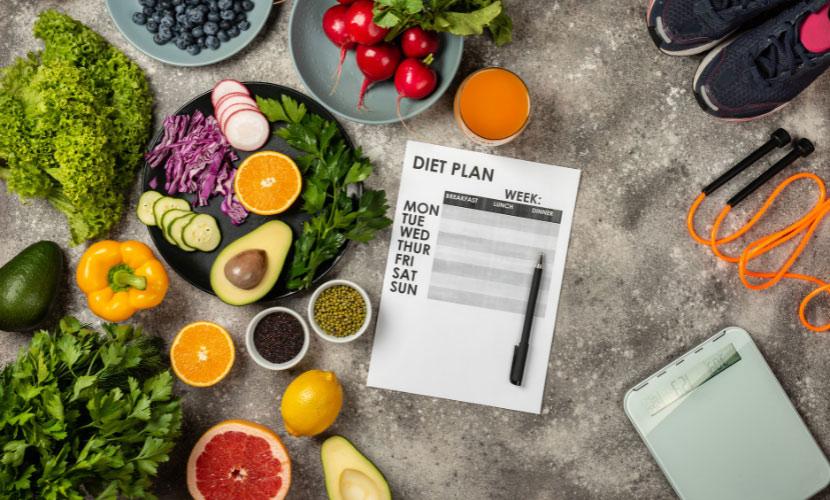🏆 As seen and loved on Shark Tank Dubai 🏆

Macros and Weight Loss
Calories Or Macros: What Should I Count for Weight Loss?
Counting macros is a revolutionary intelligence in the fitness and nutrition industry. It shifted the narrow-minded calorie-focused approach and forced fitness gurus to start looking at things from a different perspective. The macro diet goes one step further than counting calories. You must ensure you hit your micro-nutrient ratio while eating within your calorie goals for better results. A macro diet helps in making smart food choices.
You must have already heard about macro-counting and its benefits from some fitness-freak friend or your nutritionists. A macro diet can prove beneficial to anyone who aspires to be fit. Anyone stuck at a weight-loss plateau or looking to build muscles or maintain a healthy lifestyle can utilize macro-diet knowledge. It is easy to adjust and adapt to.
As mentioned, a macro diet helps people to make smarter food choices. For example, a pack of Oreos consists of 137 calories and one serving of pita bread with hummus is around 150 calories. Both food items have almost equal calories, but the latter one meets your macro goals. The pita is made from whole grains, hummus is a rich source of protein, and the drizzle of olive oil gets you the healthy fat that your joints need.
If you just look at the calorie, it seems perfect for a snack, but when you start counting your macros, that's where the change happens.
Understanding Macros
Macros, short for macronutrients, are the three primary nutrients that provide energy to the body: carbohydrates, proteins, and fats. Understanding macros is essential for a balanced diet. Carbohydrates are the body's main source of energy and are found in foods like grains, fruits, and vegetables. Proteins are crucial for the growth, repair, and maintenance of body tissues and can be obtained from sources like meat, legumes, and dairy products. Fats provide energy, support cell function, and help absorb certain vitamins. They can be found in foods like oils, nuts, and avocados. Balancing the intake of these macronutrients is key to a healthy and well-rounded diet.
How is it Different from Calories?
Macros and calories are related but represent different aspects of nutrition. Macronutrients provide energy and have specific roles in the body. Calories, on the other hand, are units of energy. They measure the amount of energy provided by consuming food or beverages. Each macronutrient has a specific caloric value per gram: carbohydrates and proteins provide 4 calories per gram, while fats provide 9 calories per gram. Calories represent the overall energy content of food, while macros focus on the types and ratios of nutrients consumed. Tracking macros and calories can be useful for different dietary goals and approaches.
Importance of Macros for Weight Loss and Muscle Gain
Macros play a vital role in both weight loss and muscle gain journeys. For weight loss, understanding and tracking macros can help create a calorie deficit, ensuring that you consume fewer calories than you burn. By balancing the intake of carbohydrates, proteins, and fats, you can support satiety, maintain muscle mass, and promote fat loss.
On the other hand, for muscle gain, consuming an adequate amount of protein is essential for muscle repair and growth. Macros can be adjusted to provide sufficient protein and calories to support muscle development, while carbohydrates provide energy for intense workouts, and fats support hormone production.
Overall, macros provide a framework for optimizing nutrient intake, ensuring that you meet your specific goals of weight loss or muscle gain while maintaining a balanced and sustainable diet.
The Right Macro Ratio
To determine the right macro balance for you, begin by calculating your total daily energy expenditure (TDEE). Share your vital stats and activity level with our nutritionists. Our nutrition experts use a standard formula to assess the total number of calories you burn on an average day. If you are on a muscle-building workout routine, make sure you share that. Our experts recommend reducing your TDEE by 10 % so your body starts drawing from fat reserves for energy. The macro ratio here depends on your fitness goals — maintenance, weight loss, or bulking up.
Why did I hit a weight loss plateau?
You might be diligently dieting and exercising but not losing weight. No matter how frustrating it can be, reaching the weight loss plateau is normal and happens to all. The first few weeks of the weight loss journey are filled with positive signs of rapid weight drop. However, the weight loss slowly reduces. It's mainly happening because when you cut calories, the body derives energy from the stored glycogen. Glycogen is primarily stored in muscles and the liver.
Glycogen, partly made of water, releases water when it is burned for energy. The initial weight you lose is mainly water, which is why the effect is temporary.
Initial weight loss may also make you lose some muscles along with fat. Muscles are responsible for keeping your metabolism up. So, muscle loss causes the metabolism to decline. Thus, fewer calories are burnt.
Because of slower metabolism, the calories you burn equal the calories you eat, and you hit the weight loss plateau. To break this weight loss plateau, you must either decrease your calorie intake or increase your physical activity. Sticking to one routine that once worked may not be the best solution.
Why VMeals?
We offer numerous benefits for individuals seeking a convenient and healthy meal solution. With us, you can enjoy customized meals tailored to your dietary preferences and needs. Whether you follow a specific diet, have allergies, or require portion control, we can accommodate your requirements. Our diverse menu options, easy ordering process, and delivery services make it a convenient choice for those looking to maintain a balanced and nutritious eating plan without the hassle of meal preparation.

Discover a New Meal Every Week
Our team keeps the excitement alive by changing our menu every week. We aim to make healthy eating easy and exciting. So be prepared to be served with a range of suitable macro meals every week, including snacks and drinks.
Dietitian-Designed
Stop the guesswork of what to eat and what to skip. Let experts handle that. Our in-house dietitians and nutritionist can discuss and create a tailored menu plan for you. They are experienced in creating meal menus for every goal and every lifestyle.
Fresh Delivery
All our meals are freshly prepared and delivered to your doorstep. You will never receive frozen meals from us. Meals are perfectly portioned and made from the freshest ingredients.
Bottom line
Macronutrients comprise three primary components of every diet — carbohydrates, fats, and proteins. Your macronutrient ratio may not directly influence your weight loss or muscle gain goals. However, it lets you be on a more sustainable diet plan, which you are more likely to stick to. With these diet plans, you do not need to deprive your body. On the contrary, you get to feed your body the ideal health-giving foods to make it more efficient. The efficiency will reflect on your exercise and overall fitness level.
There are several apps available that help you track your macros. If taking out your phone every time before meal planning seems tedious to you, book your monthly meal plan in Dubai with us. Let these healthy meal choices become a part of your lifestyle. Healthy options eventually become healthy habits. With persistent efforts, you will surely meet your fitness goals soon.
Reach out to start your fitness journey with us!
Meal Plans
Delivery Details
Legal Information
© 2020-2026 VMeals. All rights reserved. VMeals™ is a trademark of Flip Side Restaurant and Cafe L.L.C
We accept
